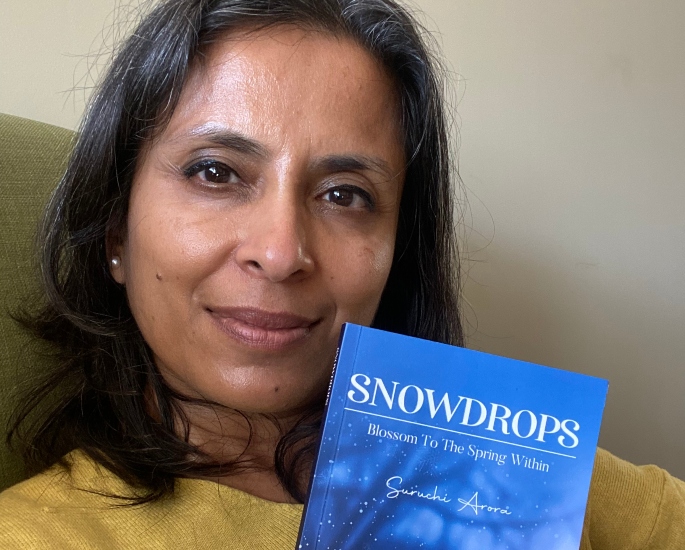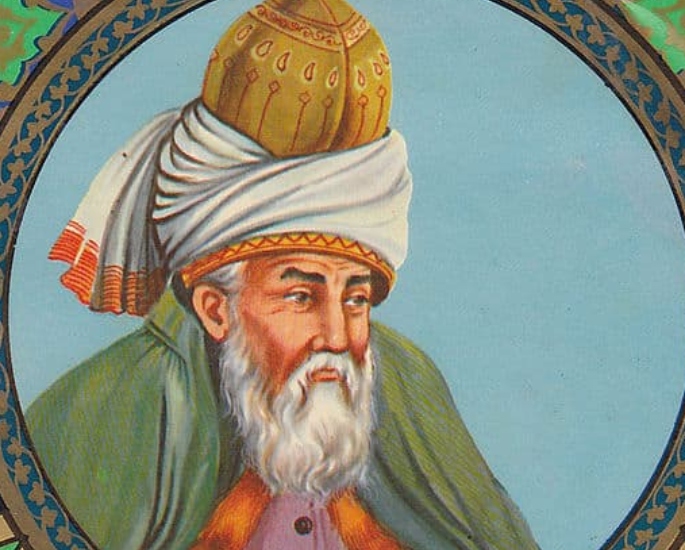"I felt as if I was flying into realms unseen."
Doctor, Reiki master and author, Suruchi Arora, is encouraging self-discovery through her 2021 poetry collection, Snowdrops.
The immersive poems take the reader on a meditative journey, helping them unlock the deeper meaning of their existence.
Many of us wonder where our true place in life lies or what impact we should have on the world.
Suruchi hopes to answer these burning questions through Snowdrops.
With each beautiful poem, she wants readers to slow down and reflect, to revive the “higher versions” of themselves.
Having been a medical doctor for over twenty-five years, Suruchi Arora turned her sights on becoming a mindfulness and meditation coach and now uses both these faculties in conjunction for helping and healing.
This illustrates how experienced and knowledgeable the author is in the mind, body, and soul. Although Suruchi is appreciative of her time within medicine, she does reveal:
“I have found more answers and ‘Power’ by practising mindfulness than I did by studying hundreds of books.”
It is this spiritual awakening that motivated Suruchi to share her vision with others.
Her first book, Find Yourself (2018), was a fictitious novel about a 21st-century woman’s unquenching thirst for wisdom, happiness, and inner peace.
Thus, with the release of Snowdrops, Suruchi has stated it is the next “phase” in a series of books dedicated to growth and self-love.
Hence, the poems in this collection lend themselves to those ideologies such as hypnotic pieces like “Effortless Flow” and “Where Am I?”.
These poems use naturalistic symbolism, raw emotions, and evocative language to blur the lines between stress and serenity.
Additionally, the inclusion of eastern philosophies makes the collection a diverse, culturally-rich, and flavourful oasis of bliss.
Suruchi Arora caught up with DESIblitz to discuss Snowdrops in more detail and the power of mindfulness and meditation.
Which moments inspired you to become an author?

Until about 2016, I used to spend most of my time engaged in the daily routines and demands of life.
When I faced a low in my life due to some personal events, a long-lost friend of mine introduced me to meditation.
She recommended I meditate for half an hour every day for 40 consecutive days.
Without questioning the logic behind it, I agreed to her recommendation and started meditating regularly.
Every meditation brought me closer to my real self, to experiences that took me deeper and higher than the places I had ever known or dreamed of.
I was witnessing my life from a very different place of self-realisation and knowing.
The insights arising from my meditations and discussions with my friend kept opening new avenues, expanding my horizons in an unprecedented manner.
“I felt as if I was flying into realms unseen.”
The bliss, beauty, vibrance and music of these places was so intoxicating that I felt compelled to share them with others.
This is when my first book Find Yourself took birth, in the form of journaling my meditation experiences, insights, and reflections.
The words of my meditation coach were the voice of ‘Master’ in that book.
Which writers have impacted your writing the most?
The writers who have sparked my own internal growth the most are Professor Bruce Lipton through his book Biology of Belief (2005) and Dr Joe Dispenza through You Are the Placebo (2014).
There are several books written on the topic of spirituality. In their ways, they all present to us the same or similar paths of self-realisation and self-love.
Being a doctor myself, I could relate most to these two writers.
They use scientific and physiological explanations for the spiritual experiences I was witnessing and understanding as I meditated. It connected more deeply with my true inner self.
I remember listening to an audio version of Biology of Belief while I was on a holiday in Croatia.
I felt as if I would explode from the realisation of so much energy and ‘knowing’. Writing it all down was my way of channelising this energy.
15th-century Indian poet and saint, Kabir Das, inspired me to write poetry. His poems are written as couplets (called ‘dohas’ in Hindi).
“I found it intriguing and inspiring how he can express a truth of unparalleled depth in just four lines.”
This way of sharing profound life reflections appealed to me.
I noticed how it takes away the preaching and suggesting parts of spiritual discourses and inspirational talks, trusting the emergence of the reader’s own wisdom.
13th-century Persian mystic and poet, Rumi, also inspired my poetry considerably.
Rumi’s metaphors of love and the beloved deepen my interpretation of God and the ‘Universal Consciousness’.
Using mystical language and metaphors in poetry leaves the readers to enjoy the poem. Yet, allowing their own interpretation to provide them with the messages they seek.
What was the origin of the title and book ‘Snowdrops’?

Influenced by my meditations, when I was oozing, or rather bursting with bliss and love that I wanted to share with others, everything I experienced turned into a poem.
For example, when I was looking at the sun, the moon, a tree, witnessing a thought of mine, an emotion, or when anyone shared their problems or anxieties.
An association would form between my experience and the internal wisdom, and ideas would simply start flowing in a rhythmic form.
It was almost as if the poems were writing themselves through me.
I used to sleep with a pen and paper next to my pillow because, sometimes, I would wake up with lines that needed to be written.
There were papers everywhere – one in every room – for I felt that the universe was speaking through me. I could hear something precious at any minute of the day.
Before my daughters showed me the notes app on my phone, I used to type my lines as messages to myself if an idea came to me when I had no paper with me.
At the time, I didn’t think much of this because my dad is a poet and has written several books. So, writing a bit here and there felt completely natural to me.
I thought I was simply taking some notes, writing a couple of poems. But before I knew it, I had quite a collection.
When I realised that my collection had gone above 50, I thought it could be my next book.
One day, in late January 2021, after a dreary Covid winter, while walking to work, I saw some snowdrops.
Those days, we had been learning and talking about resilience in our workplace.
These snowdrops smiled at me and showed me how resilience exists in nature, and so within us, ever so effortlessly, authentically, naturally.
The message I wrote to myself during that walk made the first lines of my blurb:
“Pure and simple shoots awake
From frozen winter, shadowed plains
They cover the Earth in beauty and bliss
And ring with the hope of spring.”
Later that day, during my yoga practice, it occurred to me that my poems were just like those snowdrops.
Simple and pure flowers arising from warm depths of a frozen crust, bringing joy and hope to anyone who would pause and look.
‘Snowdrops’ is a tool in meditating/seeking yourself. What was the importance of this?
The human mind has been evolved to think beyond survival. This mind of ours is a blessing to us so we can enjoy and benefit from its creativity and conscious thinking.
Not knowing how to use a new laptop or phone can spoil our experience and the usefulness of our gadgets.
Likewise, not understanding our mind and how it works can reduce the usefulness and benefits of this exceptional gift that we have been granted.
Minds do not come with a user manual, but they have a self-running programme that can guide us to their optimum use. This is where meditation comes in useful.
“Meditation helps us connect with our deeper knowing.”
It opens our eyes to the working of our mind, guiding us from within, towards steps that can lead us to a calmer and contented life.
Learning from inner intelligence has the added advantage of bypassing the pretence and the ego with which we live these days.
Reading books, liking inspirational quotes, and learning techniques can go only so far in helping us change our mindsets and lives.
Meditation opens our minds to internal knowing, so the change really flows past our own internal barriers and beliefs.
Which poems from the book help you personally achieve self-discovery?

Interestingly, there is a poem titled “Meditation”, which does just that – inspire me to go within.
My favourite lines from the poem read:
“Close your eyes to the flaws you see,
Open them to the ones you don’t.
Close your eyes to what your mind has created,
To experience what has created the Mind.”
Another poem “Ocean in a Wave” is my all-time favourite.
It crystalises a spiritual universal phenomenon/universal truth that is otherwise very difficult to describe or understand.
The poem is the story of a wave that arises from the ocean with energy, speed and a dream of reaching for dry land, to make her home.
It is so beautiful in poetry that I do not wish to spoil its essence or depth by describing it in prose:
“A tiny little wave,
I want so much fun.
Excited and exuberant
To take on the world.”
I may be biased but I do urge you to read that poem.
When writing your poems, where do you draw your inspiration from?
I draw my inspiration from life and nature. I have always been a reflective thinker and a keen observer of subtle emotions.
These faculties have been polished considerably since I started meditating. Every experience I live registers itself deeply in my heart and soul.
As if a seed is being planted in fertile soil, where it germinates for a few days in the warmth of reflection and sprouts out as a poem.
Usually, my insights are based upon my observations of my own self or the collective humanity.
When I am going through any repetitive thought patterns or emotions, I observe them with deep curiosity.
I practice meditative inquiry until another layer of clarity is revealed, leading to insight and a poem being born.
“Nature is the holiest scripture. From childhood, I have had a fondness for nature.”
When I am troubled by anything, I ask myself – ‘what would a tree think about this?’, or ‘how would the sun feel?’, or ‘what would the flower do if it were me?’.
Nature has been managing itself for billions of years and we are all part of nature. So, I feel that nature must have the right answers for us.
When I look towards nature for inspiration, I use the same metaphors in my poems to express what I learn from it.
I suppose you can say that my research is in everything I see.
Every flower I smell, every tree I hug, every person I meet, every dream I dream, every challenge I face, every failure I face, every moment I live.
What key messages do you want the readers to understand from the book?

There are infinite attractions in our world, all competing for our attention.
As a society, we have created artificial and very high standards, and we feed these standards and goals to each other and to our children.
The high level of engagement with satiety of the five senses causes us to live with anxieties, envy, greed, hatred, judgement, crime, and consumption.
Whatever we do, achieve, or accomplish, there is always something that we do not have. And if that is not the case, there is the fear of losing what we have.
By meditating, we slow down our pace. It allows us to create space around our experiences, so we can live them more deeply and thoroughly.
Living in this way provides more fulfilment in simpler things of life. It reduces the need for chasing more things and remaining busy in trying to acquire them.
We realise that we are whole and complete as we are. Meditation also connects us with our inner wisdom, our sixth sense.
This sixth sense inspires intuition, creativity, and love to arise and our mindset and life changes to become simple, pure, and fulfilled.
Another very important message that I wish to share through this book is self-love. We often rely on others to offer us kindness and compassion.
We want our relationships to complete us, to provide us with the love and care we feel we deserve.
Before focusing on the outside world for providing us with what we need, these poems encourage and inspire the reader to become their own friend.
Treat themselves the way they want others to treat them. You will find that you are the best person to love you, just the way you like it.
Once you love yourself, your relationships with others improve. Because you are not needy or expecting all the time, rather you are complete and self-assured and can provide a mature connection.
Do you use other cultural themes besides ancient eastern philosophies in the book?
The universal consciousness does not belong to any culture, religion, or part of the world.
It is experienced, expressed and lived by and through everyone and everything alike. Meditation brings this consciousness to our awareness.
Meditation is formally an eastern tradition, practised widely in Hindu and Buddhist religions.
It has been adopted by western philosophers into a new form called ‘mindfulness’. This incorporates scientific explanations and techniques for teaching and practising.
“Mindfulness is a great tool to reduce stress and anxiety and enhance our experience of life.”
But the wisdom of ancient eastern philosophies provides a much deeper spiritual awakening, offering a life of simplicity, content, oneness, and trust.
Having been born in India and lived there for the first half of my life, these philosophies are an integral part of my being and hence, my writings.
As I have lived in the UK for the second half of my life, most poems are set in the English countryside.
They are inspired by the sceneries, seasons, and lifestyles of this country.
What has been the reaction to ‘Snowdrops’?

I will be honest in stating that the reaction to Snowdrops has been unprecedented and overwhelming.
I am pleasantly surprised to hear people say that this has become their bedside book, their saviour, their guiding light, their new best friend.
Also, I have had some amazing independent critical reviews. In her review, author and editor, Dr Sulakshna Sharma compared my poems to those of Rumi and Khalil Gibran.
There is a no bigger honour than being compared to your inspirational gurus and guiding stars.
She says she fell in love with my book and has become a fan.
Poet, novelist, critic, and author, Mr P C K Prem wrote, “freshness in phrase, simplicity in expression and technique, intrinsic classiness and innovative approach make this collection beautiful and unforgettable.”
In another review, Dr S Padmapriya wrote, “the author takes the reader on a mystical ride on the waves of poetry with candidness and compassion.”
Personally, my most favourite reaction was from a casual reader – a receptionist at work who saw another colleague’s copy lying on the desk and opened a page out of curiosity.
She later told me that she was simply browsing. But the only poem she happened to read, inspired and coached her to think differently.
It changed her attitude towards a relationship difficulty she was going through at the time. This really made the whole effort and book worth it for me.
How do you think poetry aids self-realisation?
Other media explicitly spoon-feed people exactly what they need to learn. With explanations, examples, references, and detailed descriptions in the case of fiction.
Poetry expresses a thought, a feeling, or an experience in a subtle, almost veiled form.
Poetry shares deep, and sometimes multiple-meaning ideas, in a musically intriguing language to capture the conscious and subconscious attention of the reader.
Because there are only a few, the words stay with the reader, imprinted on their heart.
But it is the blank spaces between those words, the unsaid words that tickle the curiosity and intrigue of the reader. Coercing them to feel, to think, to say the unsaid.
The beauty is that every reader makes their own interpretation of the same poem. This interpretation is a response to their own state of being.
“The same poem can lead different people to different self-realisation.”
Do you feel self-discovery is promoted enough in South Asian communities?

I do think that the idea of self-discovery is catching on in South Asian cultures.
I hear about next-generation schools with open style learning, people travelling, students getting involved in charities, and going abroad for studying.
Also, I hear about art exhibitions, alternate and fusion music, and dance forms.
This does fill me with the hope that at least some part of our society is receiving an opportunity to think outside the box.
There is a lot more that can be and needs to be done to encourage creativity, self-expression, and self-realisation in coming generations.
The higher effort required to provide for the daily needs of self and family, and the deep embedding of social pressures in eastern cultures leaves lesser room for self-discovery.
This is why I feel it is our responsibility as artists, writers, poets, thinkers, and designers to inspire. We should guide our young towards a life where they feel like they can fly.
What can you exclusively tell us about your forthcoming projects?
The folder named “poetry 2” (poems written since the publication of Snowdrops) on my laptop is getting bigger by the day.
I do post some of those poems/couplets on my Instagram page and my FB page quite regularly.
My next project will be a sequel to the first two books.
After Find Yourself was published, an idea dropped into my heart.
There will be three books in order to find yourself, awaken yourself, and dissolve yourself. I see these as the three steps of our spiritual journey.
Snowdrops is the second step (awaken yourself).
The third step, dissolve yourself, will be even more minimalist, with very few written words, but very profound and high-impact content.
These books come to me in their own time though. So, I must wait in patience and surrender and keep an eye out for the sign.
Undoubtedly, Suruchi Arora promises to unravel the reader’s mindset and provide them with a foundation of personal growth with Snowdrops.
The imagery within each poem is effortlessly emotive, relatable, thematic, and thought-provoking.
Interestingly, the collection even outlines numerous ways in which the collection can be read, providing the ultimate reading experience.
Suruchi Arora’s aim of the book is uplifting and is a unique perspective on how we can better ourselves in society.
The experiences, wisdom, and free-spirited nature of the collection are joyful and refreshing.
Snowdrops is not a step-by-step guide. Rather, it is a spiritually powerful exploration of how one should activate their full capability.
Find out more information about Snowdrops here.






























































